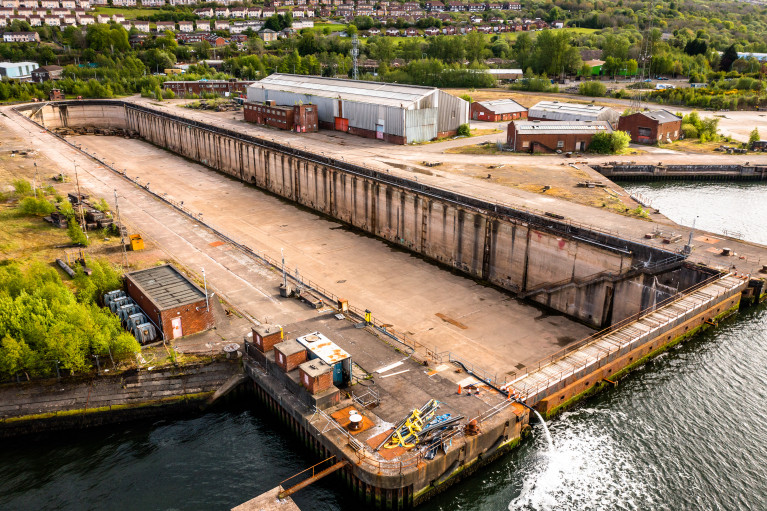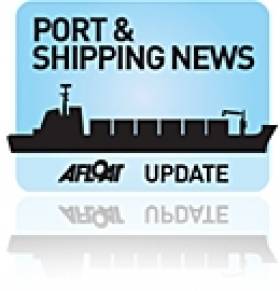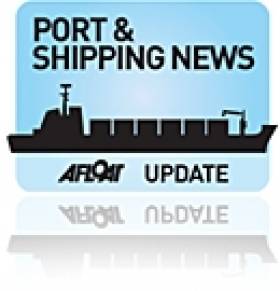Displaying items by tag: Ship Recycling
Ship Recycling Deal in Scotland to Create 100 Clydeside Jobs in Inverclyde
On Clydeside, Scotland is where a long-term deal at the Inchgreen Dry Dock at Inverclyde, has been signed that will create around 100 jobs as an export hub for responsible decommissioning of global shipping fleets.
North-East England based ATLAS Decommissioning, which specialises in the end-of-life disposal of marine infrastructure, has contracts in place with “blue chip” container lines for multiple vessels that they are removing from their current trading fleet.
The contract is for the lease of the giant Inchgreen Dry Dock facility and adjacent land, which will become an export hub for recyclable metals (see unrelated story on Wicklow Port)
A waste management licence has been granted by the Scottish Environment Protection Agency (SEPA).
The new jobs at Inchgreen will include trades and skills which exist in abundance in the local area.
Mike Wood, Project Director of ATLAS Decommissioning, said: “Inchgreen Dry Dock, as well as its size, also has direct access to very deep water. As a facility for the contracts we have in place I’d go as far as to say it is unique in the UK.
“There is also the attraction of the skilled workforce in Inverclyde due to its shipbuilding legacy. What we are doing here is essentially shipbuilding in reverse and requires much of the same engineering excellence and expertise.”
Peel Ports director Jim McSporran said: “Inverclyde’s economic woes are well-documented, with Office of National Statistics records showing an overall unemployment rate of 5.2%. We have promised to bring jobs to Inverclyde, and this is just the start.
“We are fully committed to having Inchgreen Dry Dock, which is a jewel in the crown of Scotland, back in full industrial use. That usage will pay full regard to such important issues as circularity and sustainability, as with this deal.
“Clydeport is a name that has a long and proud affinity with Inverclyde, and it now has the strength of Peel Ports, the second biggest ports group in the UK, behind it. We are excited to be working with ATLAS Decommissioning, a company with strong connections to global players in the shipping industry.
“This contract is a shining example of our stated commitment in Inverclyde and at all of our ports throughout the UK to local job creation in high unemployment areas that have a long and proud industrial history.
“We have been engaging closely with Inverclyde Council as we worked to secure this contract, which we believe will be a game changer for the area and a sign of more economic benefit to come.”
Scottish Government Business Minister Ivan McKee said: “This is excellent news for the Inchgreen Dry Dock, for Inverclyde and for Scotland.
“There is no doubt the pandemic has had a significant impact on our economy and therefore to see a company like ATLAS Decommissioning investing in Scotland’s economy and creating new jobs is very welcome and send a strong message to other investors.
“The Scottish Government is firmly focused on working together with business to seize Scotland’s potential and build an economy for everyone by delivering greater, greener and fairer prosperity.”
Councillor Stephen McCabe, leader of Inverclyde Council, added: “This is a terrific shot in the arm for the Inverclyde economy that will deliver almost 100 new, skilled jobs to the area and breathe new life into a key asset which is of local and national significance.
“This fits perfectly with our ongoing Inverclyde Works campaign to promote the area as a place to live, work and do business and ties in nicely with our £9.4 million regeneration plans for the wider Inchgreen area through the Glasgow Region City Deal.
“Working alongside Peel Ports Clydeport and by welcoming inward investment from companies like ATLAS Decommissioning, we have the potential here to make Inchgreen a centre of excellence for marine engineering and marine-related activity.”
#ShippingReview - Over the last fortnight Jehan Ashmore has reported from the shipping scene where the saga of the 'Ghost Ship' MV Lyubov Orlova may finally have come to an end in the Atlantic.
The European Parliament has finally adopted the new Ship Recycling Regulation by a large majority at a meeting in Strasbourg.
Preliminary figures released by the Central Statistics Office show Ireland's seasonally adjusted trade surplus rose 1% to €3.2bn in August.
A welcome boost to the Irish economy is the number of trips by overseas residents increased by 7.8% between July and September compared to the same period last year.
Ardmore Shipping acquired a 45,726 Dwt MR product tanker built in 2006 from a Japanese shipyard, for approximately $20.5 million. Her sister, Ardmore Seafarer successfully fought off an attack by pirates.
Fyffes, Europe's biggest banana importer headquartered in Dublin is through its Costa Rica base exporting fruit to growing markets in Russia and the Middle East using new high-tech containers.
EU Parliament Rejects Controversial Ship-Recycling Levy
#ShipRecycling – The European Parliament has today rejected proposals to introduce a levy on all ships calling at EU ports that would finance a fund to support sustainable recycling of ships.
The proposal had been introduced earlier by Parliament's Committee on Environment, Public Health and Food Safety (ENVI).
Instead, MEPs approved an amendment which calls upon the European Commission to submit by 2015 a legislative proposal for an incentive-based system that would facilitate safe and sound ship recycling.
"We welcome the outcome of the vote", said European Sea Ports Organisation (ESPO) Secretary General Patrick Verhoeven, "We understand the need to create an incentive for shipowners to opt for sustainable recycling, but the side-effects of the levy on the competitiveness of EU ports would have been very negative in terms of traffic evasion, changed ship calling patterns and modal back shift, not to mention the bureaucracy involved with it.
By referring the task to create an incentive-based system to the Commission, there will be time to work out an adequate framework which would match the aim of creating sustainable conditions for ship recycling with respect for international rules and the competitiveness of European ports."
The vote by the EU Parliament is not a final one, it gave a mandate to open negotiations with Council in order to come to an agreement in first reading.


























































